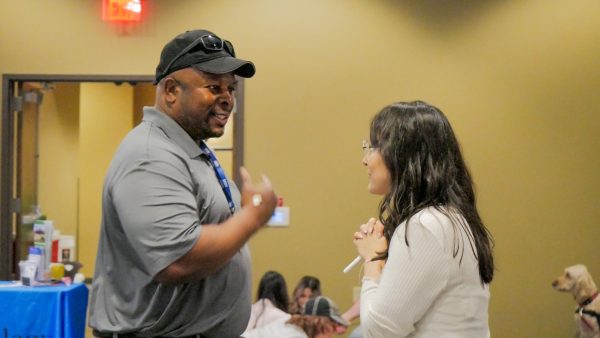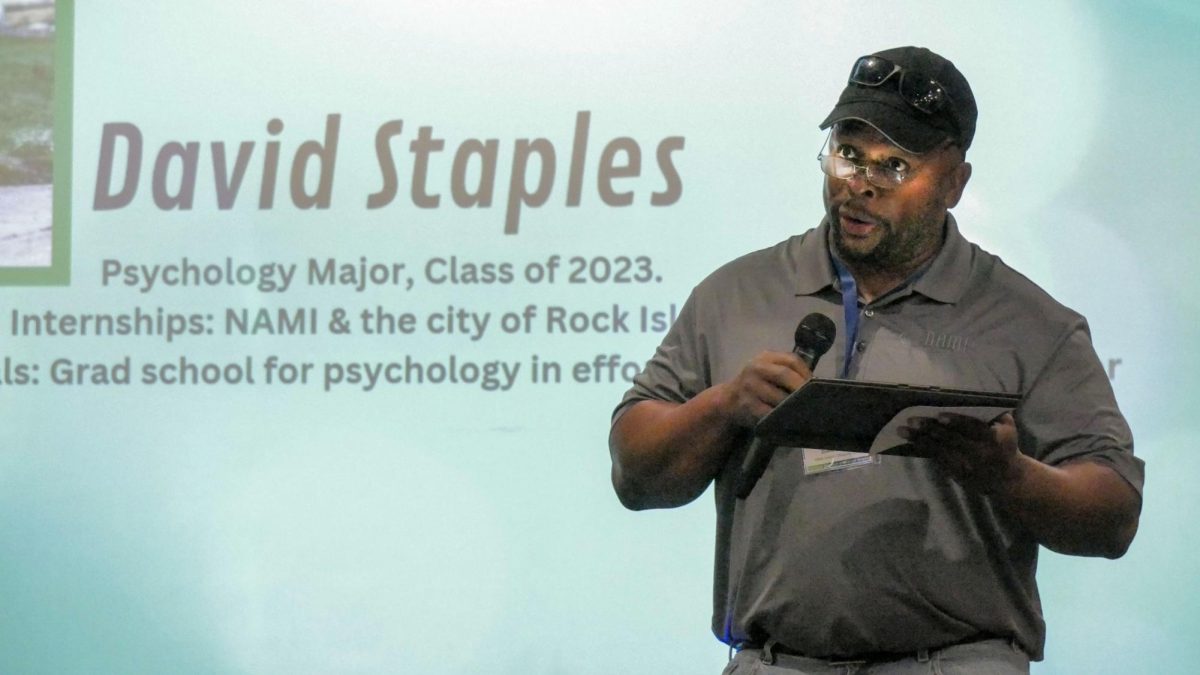What’s a single day out of four years? Less than a tenth of a percent of its whole, it is overshadowed by the other 99.93%. Yet, for so many students, graduation day can feel large beyond belief. Years of coursework toiled over, exams taken and friendships built have culminated in one day.
For upcoming graduate David Staples, that journey has been longer than just four years. Graduation represents the end of one chapter and the beginning of a whole new one.
Staples, a senior at Augustana, started his college journey more than 30 years ago, but found himself accused and convicted of a crime he didn’t commit. A decades-long process of fighting for exoneration hasn’t seen his conviction overturned yet, but recent years have brought new opportunities for education and community.
In 2021, he was accepted into the Augustana Prison Education Program (APEP), founded and directed by Sharon Varallo. The program aims to provide college education to incarcerated men at East Moline Correctional Center (EMCC). Staples was released from EMCC in 2022 and will graduate in a few short weeks with a degree in psychology, an accomplishment he says hasn’t been without major challenges.
“For me, there was a learning curve with technology—I’m being frank and vulnerable about that,” Staples said.
Although APEP provides the opportunity for a degree, technology is only one hurdle to overcome when approximating a college experience within a prison. Images from APEP’s beginning show a near-empty bookshelf, for example. Varallo said that bringing any outside resources into EMCC can take great time and effort.
“We didn’t have computers until a couple of weeks ago, so they wrote all their papers by hand, draft after draft,” Varallo said.
Barriers like these exist in addition to those inherent to the environment of a prison, described by Varallo as “punitive, retributive and inexcusable.” Staples said that maintaining a belief in his ability to succeed made his graduation possible.
“The encouragement I received from the professors while in APEP is what made the biggest difference,” Staples said. “The goal has always been to do that which I stated I can do.”

In addition to bringing education and physical resources to EMCC, more than 30 faculty who work within APEP have the task of bringing hope to their students. Similarly to on-campus teaching, that process begins by fostering positive relationships with and among students.
Building trust and an environment of acceptance isn’t always easy. APEP was modeled after existing programs, but those initiatives aren’t always perceived in the same way by their students. Staples said that his prior experience in prison education wasn’t a positive one.
“I was in a program—I won’t say the name—which was similar [to APEP], but I wasn’t even on the rosters of the institution. That feeling alone says, ‘you’re not accepted,’” Staples said. “Augie’s approach to it, making [EMCC] a satellite campus, made a difference.”
Varallo witnessed the community-building capabilities of APEP firsthand. As one of the first educators in the program and Staples’ advisor, she said she has seen his growth as a student and a leader throughout the years.
“He kept his cards close to his vest, but by the end of my first class, he was cracking really silly jokes,” Varallo said. “He was a quiet leader, and other students looked up to him.”
Now, as Staples looks towards his graduation, he has plans to become a leader beyond the confines of college. He hopes to attend grad school and take on a position as a counselor, guiding people towards healthy lives and away from the carceral system that he found himself placed into.
“My target is youthful offenders who’ve been impacted by the carceral system—kids who can actually have a chance of being redirected in their lives,” Staples said.
Though he has faced delays being accepted into programs which would facilitate his future as a counselor, Staples said that his character and high performance in college give him confidence that he will achieve his goals.
As for his plans to transition quickly from postgrad to pursuing a doctorate, Staples said that his motivation stems from a desire to keep his momentum going.
“There are not a lot of expectations of me, having been in the system so long,” Staples said. “This is the state I need to move forward and create that narrative that I’m seeking for myself.”
Staples’ graduation represents a turning point for himself, and an opportunity to represent his image through his successes. It also represents the power that APEP has to enact meaningful change in the lives of those most in need of it. That power, rather than being inherent, comes from the hard work of the students and faculty involved.
What began in 2021 with 10 students and a small group of volunteers and organizers has expanded into a program with 35 students and 23 educators, offering courses from mythology to environmentalism. Varallo said that the support of individuals across Augustana makes it possible to do what APEP does.
“This could not happen without support from every campus department, from the library to the registrar to the dean’s office,” Varallo said.
In Staples’ case, as with other future graduates, that support continues should students transition from EMCC to Augustana’s campus. Rather than the threadbare preparation provided to incarcerated individuals, Varallo said that successful reentry will be a focus as APEP grows.
“We want our guys to be successful here on this campus, and we’re figuring out how to do that while we’re building the program on the inside,” Varallo said.
The deep meaning and freedom of re-entering society after any length of incarceration cannot be overstated. Leaving EMCC to join on-campus students can be bittersweet, though. Just as any other students, those in APEP form meaningful relationships with their peers through education and shared experiences.
Staples is one of three students to transition to Augustana’s main campus from EMCC, a group which also includes TY Stone and Jay Marks. Jason Mahn, who was Staples’ professor during his first semester as an Augustana student, said that old connections are maintained and new ones made even when some students leave EMCC.
“There are people coming to these [formerly incarcerated] folks from outside of APEP; other incarcerated folks who want help filling out paperwork or other things,” Mahn said. “They’re being identified as leaders.”
In this sense, programs like APEP make clear their ability to benefit not only student participants but other incarcerated individuals. Also clear is the powerful effect of education in reducing the likelihood of reoffense for those not wrongfully convicted.
“The number one reducer of recidivism rates is education in prison,” Mahn said.
The continued success and growth of APEP requires the dedication of faculty, the cooperation of individuals working in the carceral system and mutual support among all Augustana students, incarcerated or otherwise. Staples’ graduation among the rest of this year’s senior class serves as a reminder that education empowers everyone to feel capable and to make the change they’d like to see.
“I’m just so delighted that [Staples] is the first to graduate and that he gets to walk across that stage,” Varallo said. “He earned it.”
Staples is ready to make the most of his new status as a postgraduate student, personally and within society.
“It’s a small step towards knowing that you can actually progress in society,” Staples said. “I move forward knowing that I can do things I was starting to believe I couldn’t do.”













































































































